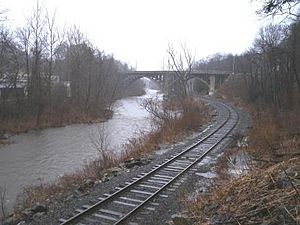Reynolds Bridge facts for kids
Quick facts for kids Reynolds Bridge |
|
|---|---|

View from south
|
|
| Coordinates | 41°39′11″N 73°4′37″W / 41.65306°N 73.07694°W |
|
Reynolds Bridge
|
|
| Area | less than one acre |
| Built | 1928 |
| Architect | Connecticut Highway Department; Haggerty, Charles A. |
| Architectural style | open-spandrel concrete arch |
| NRHP reference No. | 04001095 |
| Added to NRHP | September 29, 2004 |
| Carries | State Road 848 (Waterbury Road) |
| Crosses | Naugatuck River |
| Locale | Thomaston, Connecticut |
| Official name | Bridge No. 603 |
| Maintained by | Connecticut Department of Transportation |
| Characteristics | |
| Total length | 148.7 m |
| Statistics | |
| Daily traffic | 3,100 |
The Reynolds Bridge in Thomaston, Connecticut is a special kind of concrete bridge. It carries Waterbury Road (also known as State Road 848) over the Naugatuck River. This bridge was built in 1928. It's one of only a few "open-spandrel" bridges left in Connecticut. Because it's so unique and important, it was added to the National Register of Historic Places in 2004. This list helps protect important historical places in the United States.
What is the Reynolds Bridge?
The Reynolds Bridge is located between Waterbury and the center of Thomaston. It's just east of Exit 38 on Connecticut Route 8. The bridge goes from the northwest to the southeast. It crosses over the Naugatuck River. It also crosses over the railroad tracks used by the Naugatuck Railroad. There used to be old streetcar tracks on the other side of the river, and the bridge crosses that area too.
How the Bridge is Built
The bridge is made of concrete and has three main arches. These arches have an "open-spandrel" design. This means that the space above the arches is open, with columns supporting the road above. On each side of the main arches, there are four shorter sections called "approach spans." These are like ramps that lead up to the main part of the bridge.
The longest part of the bridge, the main arch, is about 169 feet (51.5 meters) long. The two smaller arches are each about 97 feet (29.5 meters) long. The total length of the bridge is about 487 feet (148.4 meters).
The arches are connected by strong concrete pieces called "struts." From the arches, tall concrete columns go straight up to hold the road deck. The road part of the bridge is about 42 feet (12.8 meters) wide. The sidewalks on the bridge stick out from the main supports, like a shelf. This design is called "cantilevered."
A Special Design
When the Reynolds Bridge was built in 1928, the "open-spandrel" design was used for the longest concrete bridges in Connecticut. At that time, it was the longest bridge ever designed by the Connecticut State Highway Department. A few years later, the Cornwall Bridge was built over the Housatonic River, and it ended up being even longer.
In 2004, when the Reynolds Bridge was added to the National Register of Historic Places, it was one of only six open-spandrel bridges still standing in Connecticut. This shows how special and rare this type of bridge design is today.
 | Percy Lavon Julian |
 | Katherine Johnson |
 | George Washington Carver |
 | Annie Easley |

